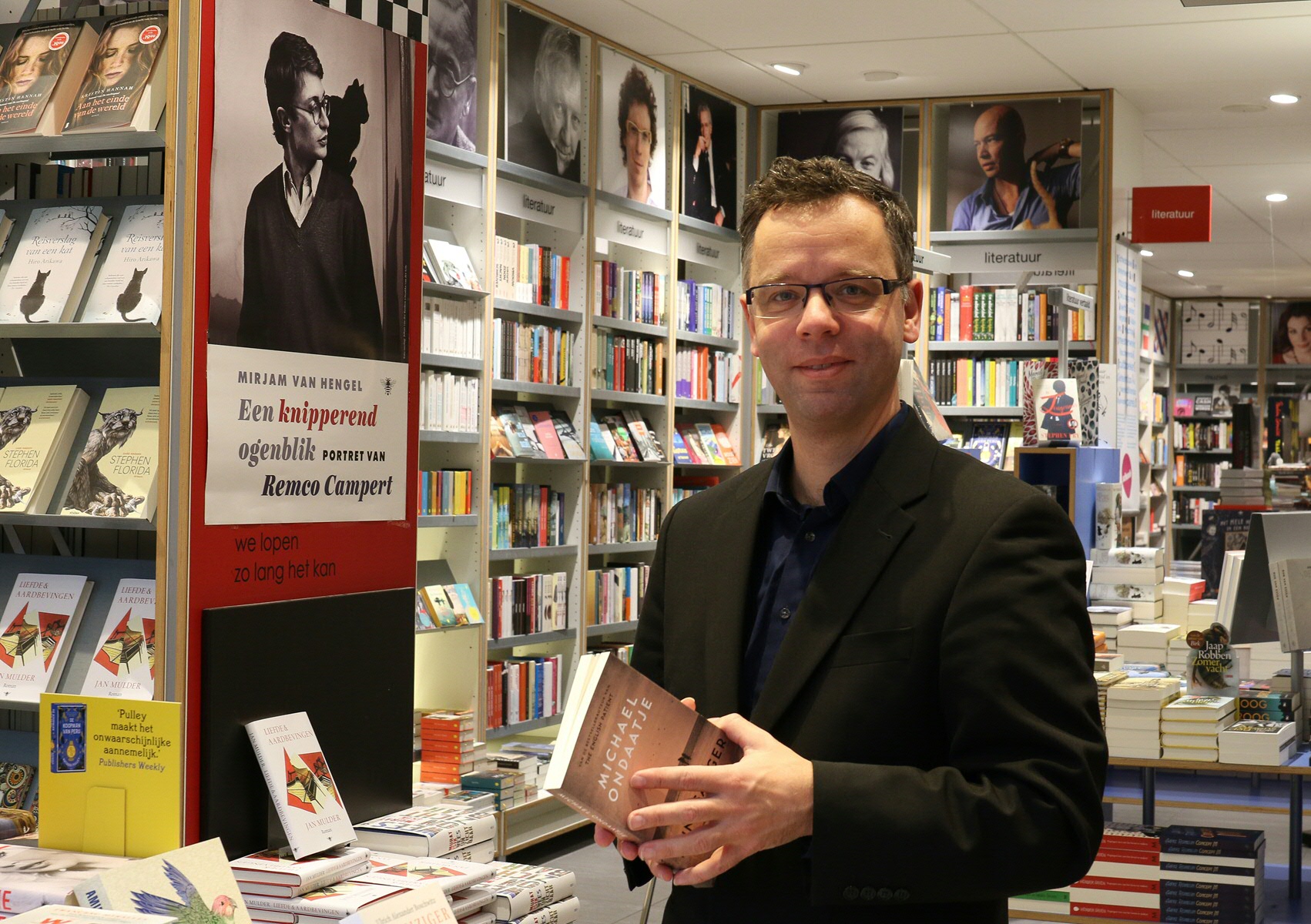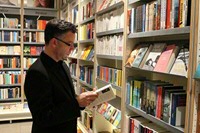Het licht voor literatuur aansteken

Mathijs Sanders leeft ín en mét literatuur en draagt dat uit waar hij kan. Als hoogleraar moderne Nederlandse letterkunde kan hij er bovendien ván leven. Hij beschouwt zichzelf als een geluksvogel. ‘Ik zou niks anders willen doen.’
Tekst Gert Gritter / Foto's: Hesterliena Wolthuis
Sanders is geen letterkundige van de oude stempel, die in termen van een canon denkt die begint bij Karel ende Elegast en probeert alles in stromingen en tijdvakken in te delen. ‘Ik kijk vooral naar het gebruik van literatuur. Niet naar wat de Nederlandse literatuur ís, maar wat ze dóét. Hoe wordt literatuur toegepast? Voor wie? Door wie? Wat is haar betekenis? Je kunt de kracht en het effect ervan gebruiken om bijvoorbeeld een politiek standpunt te legitimeren. Denk aan Thierry Baudet die in de Tweede Kamer het gedicht “Oneindig wakker” van Menno Wigman voordroeg, maar dan in aangepaste vorm. De lacherige reacties van kabinet en Kamerleden op die voordracht was onthullend. De vraag is dan vooral wat de spreker wilde bewerkstelligen met zijn voordracht en welke effecten hij sorteerde bij verschillende publieken. Wat doen teksten met mensen en wat doen mensen met teksten?’
Twee verbredingen
Sanders definieert zijn leerstoel moderne Nederlandse letterkunde breder dan vroeger het geval was. ‘Ten eerste zie ik een verschuiving van “literatuur” naar het “literaire”. Het literaire is een speciale, bijzondere manier om taal te gebruiken. De mens is een talig wezen en het literaire vind je overal, tot in de haarvaten van de samenleving. In spel, toneel, film, muziek, politiek. De neerlandistiek kan helpen bij het duiden, interpreteren en begrijpen van zaken buiten de literatuur. De tweede verbreding is de verbinding van de neerlandistiek met literatuur uit andere taalgebieden. Het idee dat het vak bij uitstek over Nederlandse literatuur moet gaan, heb ik losgelaten. Het gaat dus niet meer om literatuur van Nederland-Vlaanderen-Suriname, maar de literatuur ín dat taalgebied. Ook vertaalde literatuur functioneert in onze samenleving en heeft daar grote invloed.’
‘Literaire belevenis’
‘De mens heeft een grote behoefte aan fictie. Romans scheppen een wereld die groter is dan je eigen belevingswereld. Fictie vergroot je vermogen om te accepteren wat anders is en helpt je allerlei onderwerpen beter te begrijpen. Dat zie je bijvoorbeeld bij “medical humanities”, een vakgebied dat ervan uitgaat dat een patiënt en zijn of haar omgeving altijd een verhaal heeft en tegelijk een verhaal is. Als de arts dat verhaal gaat begrijpen, gaat hij ook de patiënt beter begrijpen. Ook dat is literair en kan daardoor een bron van kennis worden. De neerlandistiek bestudeert dat verschijnsel en het effect daarvan. Het vak heeft daardoor een veel grotere reikwijdte dan veel mensen denken. Vooral daarvan wil ik mijn studenten bewustmaken. Van wat ze dankzij hun studie in handen hebben, door het vermogen allerlei onverwachte dwarsverbanden te maken.’
Aantrekkelijkheid
Sanders is een hartstochtelijk pleitbezorger van literatuuronderwijs en hekelt het al te grote gewicht dat het voortgezet onderwijs toekent aan de ‘zakelijke’ kanten van kennis over en van de taal. Het schoolvak Nederlands is volgens hem bijna gereduceerd tot een geavanceerde vorm van ‘begrijpend lezen’, waar veel te weinig aandacht is voor het plezier dat het de lezer schenkt. De nadruk ligt meer op ‘vaardigheid in taal’ dan ‘aardigheid in taal’. Dat leidt tot een verschraling van de kennis die wordt overgedragen in het onderwijs, maar is ook nadelig voor de aantrekkelijkheid van het beroep van docent Nederlands en van de studie Nederlands. Het aantal studenten Nederlands aan Nederlandse universiteiten loopt terug. Dat zijn zorgelijke ontwikkelingen voor zijn vakgebied, waarbij ook nog eens de ontlezing hand over hand toeneemt, vooral bij jongeren.

Comfortzone
Niettemin is Sanders geen somberman. ‘Ik kom niet snel in een crisisstemming. De trend van ontlezing zal ik niet ontkennen. Toch merk ik dat het niet zo moeilijk is mensen te overtuigen van de zin van literatuur. Op middelbare scholen kom ik soms om te vertellen over literatuur. Ik merk dan hoe makkelijk scholieren te enthousiasmeren zijn. Hoe snel “het lichtje aan kan gaan”. Dat het aantal studenten Nederlands terugloopt is een gegeven. Maar teruggang hoeft niet per se teloorgang te zijn. Het haalt ons uit onze comfortzone en dwingt ons goed na te denken over nieuwe richtingen. Dat is ook een kans. Bevlogen opleiders moeten nu voor alles laten zien dat de literaire belevenis maatschappelijk van grote waarde is. Overigens is de studie van het Nederlands in het buitenland juist heel populair. Er zijn daar meer studenten dan in Nederland. Een voordeel daarvan is dat de neerlandistiek internationaler wordt. Ik merk het hier in Groningen, waar veel buitenlandse studenten en onderzoekers komen om de taal te bestuderen. Zo is er een Amerikaan, die geïnteresseerd is vanwege de historische band tussen Nederland en de VS. En een Russin, omdat er zoveel Nederlandse kinderboeken in Russische vertaling bestaan.’
‘Nooit meer slapen’
Onvermijdelijk is de vraag welke roman Sanders het best vindt of welk boek de meeste indruk op hem heeft gemaakt. ‘Ik kan niet meteen één titel noemen. Het is aan persoonlijke veranderingen onderhevig. Als kind las ik vroeger enorm veel, maar mijn eerste literaire leeservaring heb ik gehad met Nooit meer slapen van W.F. Hermans. Ik kwam die roman wel in, maar er niet meer uit… Verder heb ik een Vestdijk-bevlieging gehad, maar later kwamen er andere schrijvers voor hem in de plaats. Zoals de Joseph-romans (1933-1943) van Thomas Mann, een dik en eigenlijk onmogelijke tetralogie, die grote weerklank vond in de Nederlandse literatuur. Het hangt er erg van af met wie ik boeken lees. Boeken openen zich vooral voor mij als ik er met anderen over spreek. Ik heb bijvoorbeeld twee jaar lang met een groepje studenten Mystiek lichaam van Frans Kellendonk gelezen. De studenten reageerden er onwaarschijnlijk heftig op, omdat het weliswaar ver van hun wereld afstond maar ook raakte aan hun zorgen en fascinaties. Het was zowel voor hen als voor mij een enerverende ervaring.’
Meer nieuws
-
19 januari 2026
Digitalisering drijft kansarme burgers soms in het nauw
-
13 januari 2026
Het goede doen in complexe situaties
